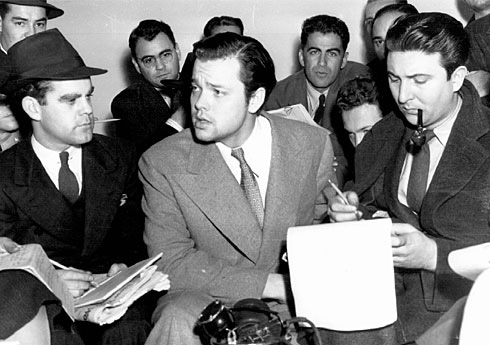
“The War of the Worlds” is an episode of the American radio drama anthology series The Mercury Theatre on the Air. It was performed at 8 p.m. Eastern time as a pre-Halloween feature on Sunday, Oct. 30, 1938, and aired nationwide over the Columbia Broadcasting System radio network. Directed and narrated by actor and future filmmaker Orson Welles, the episode was an adaptation of H. G. Wells’ 1898 novel The War of the Worlds. It became famous for causing mass panic, although the reality of this legend assumed to be fact is currently disputed by historians.
The first two thirds of the one-hour broadcast was presented as a series of simulated news bulletins, which suggested that an actual alien invasion by Martians was currently in progress. The program was a sustaining show without timely commercial interruptions, adding to the program’s realism.
The broadcast included a clear introduction that the show was a drama, and this announcement was repeated three more times – before and after the midway break, and at the end. Also, radio programming schedules in Sunday newspapers listed the CBS drama, “The War of the Worlds.” The New York Times for that day included the show in its “Leading Events of the Week” and published a photograph of Welles with some of the Mercury players, captioned, “Tonight’s show is H. G. Wells’ ‘War of the Worlds.'”
But some listeners heard only a portion of the broadcast and, in the tension and anxiety prior to World War II, mistook it for a genuine news broadcast. Phone calls came in to CBS stations, newspaper offices and police headquarters around the nation with requests for verification of the news. Reports came in of rioting, vigilante committees that formed to go after the Martians, masses of people jamming highways in their cars to evacuate their cities, and suicides.
Another announcement was repeated three times on CBS later that evening, reminding listeners that the network had clearly described the program as a drama and that”while the names of some American cities were used, as in all novels and dramatizations, the entire story and all of its incidents were fictitious.”
In the days following the adaptation, there was widespread outrage in the media over the broadcast, which editorialists bloviated about as deceptive and requiring of tighter regulation by the Federal Communications Commission. More than the New York City stage productions by the Mercury Theatre, the “War of the Worlds”on-air episode secured Welles’s fame as a dramatist.
Historical research suggests the panic was far less widespread than newspapers had indicated at the time (to sell more copies, no doubt). “[T]he panic and mass hysteria so readily associated with ‘The War of the Worlds’ did not occur on anything approaching a nationwide dimension,” American University media historian W. Joseph Campbell wrote in 2003. He quotes Robert E. Bartholomew, an authority on mass panic outbreaks, as having said that “there is a growing consensus among sociologists that the extent of the panic…was greatly exaggerated.” In fact, the program had relatively few listeners.
A study by the Radio Project discovered that fewer than one-third of frightened listeners understood the invaders to be aliens; most thought they were listening to reports of a German invasion or a natural catastrophe. “People were on edge,” writes Welles biographer Frank Brady. “For the entire month prior to ‘The War of the Worlds,’ radio had kept the American public alert to the ominous happenings throughout the world. The Munich crisis was at its height…. For the first time in history, the public could tune into their radios every night and hear, boot by boot, accusation by accusation, threat by threat, the rumblings that seemed inevitably leading to a world war.”
Mainstream newspapers already knew the name of Orson Welles in connection with the previous year’s runaway hit musical that he directed, Marc Blitzstein’s The Cradle Will Rock, a biting radical satire of the ruling class which became the Mercury Theatre’s first staged production. The radio incident may have been blown out of proportion and exploited to smear Welles’s reputation as a dangerous subversive out to overthrow the American system. With his films Citizen Kane (1941) and The Magnificent Ambersons (1942) Welles certainly did offer a trenchant critique of the press and capitalist values in general.
Over the years hundreds of radio producers and small theater companies have aired or staged live versions of “The War of the Worlds” for the entertainment of their audiences. The piece now has a kitschy quality that the public accepts as the hyperventilated style of newscasting in the 1930s.
In 2003, the Mercury Theatre broadcast of “The War of the Worlds” was one of the first 50 recordings made part of the National Recording Registry of the Library of Congress.
Adapted from Wikipedia and other sources.
Photo: The next day, Oct. 31, Orson Welles tells reporters that no one connected with the broadcast had any idea it would cause panic. | Wikipedia (CC)

MOST POPULAR TODAY

High Court essentially bans demonstrations, freedom of assembly in Deep South

Zionist organizations leading campaign to stop ceasefire resolutions in D.C. area

U.S. imperialism’s ‘ironclad’ support for Israel increases fascist danger at home


UN warns that Israel is still blocking humanitarian aid to Gaza






Comments